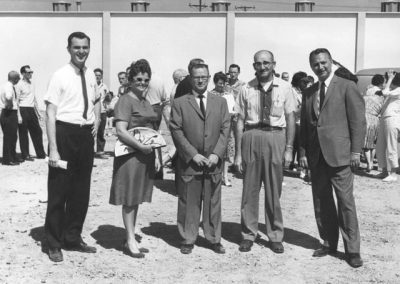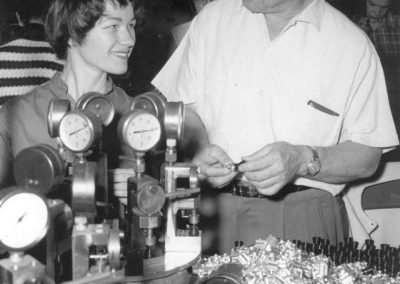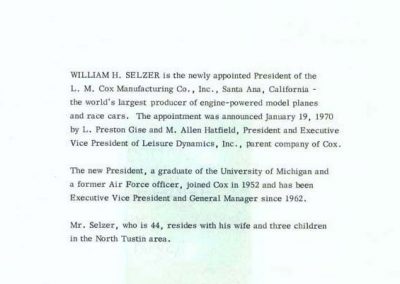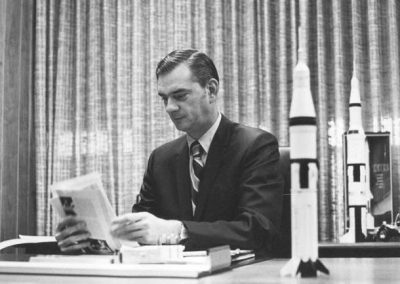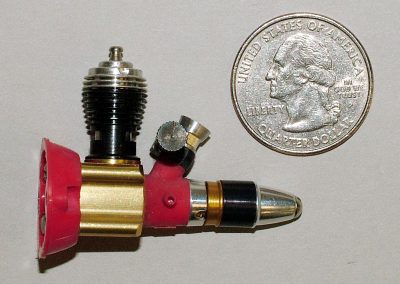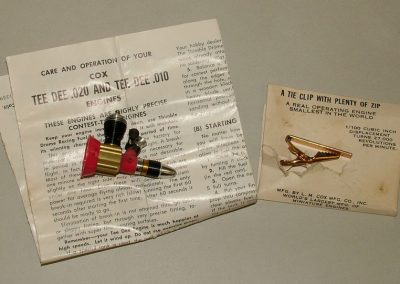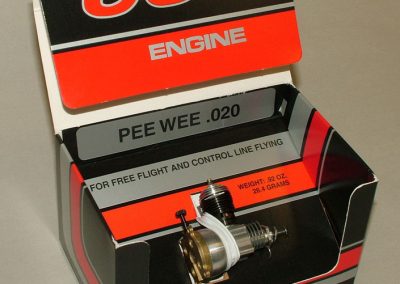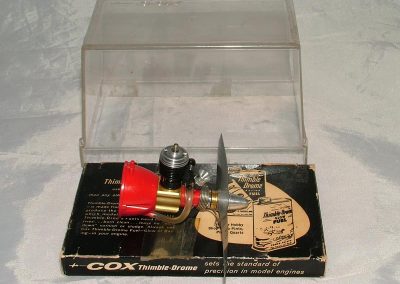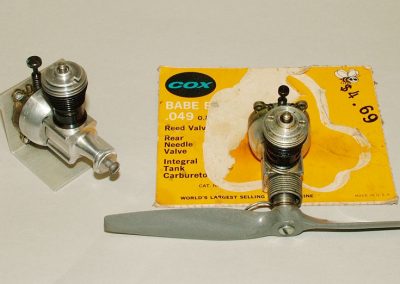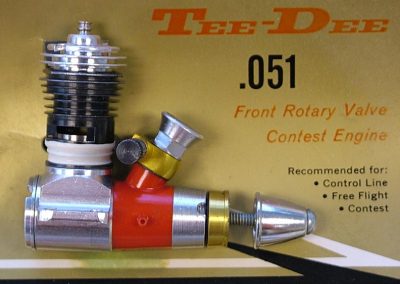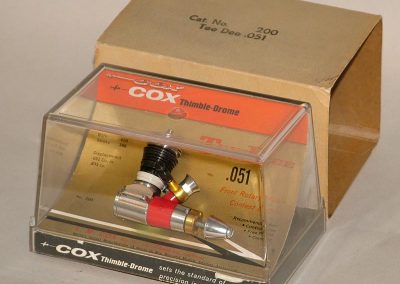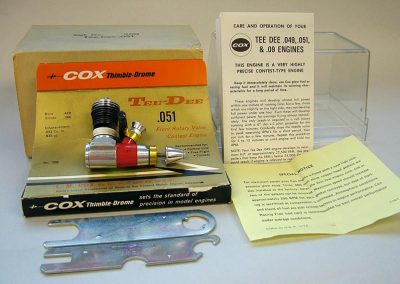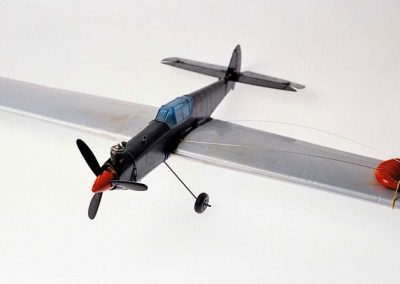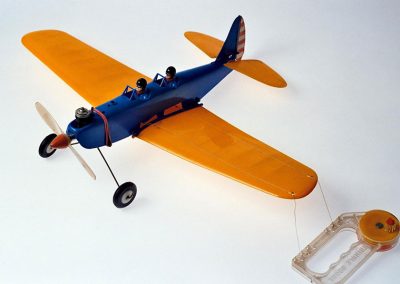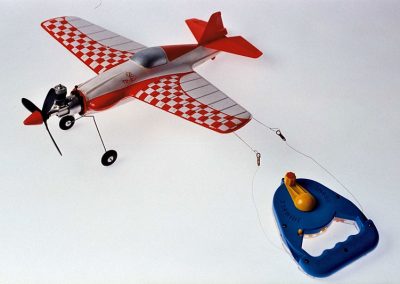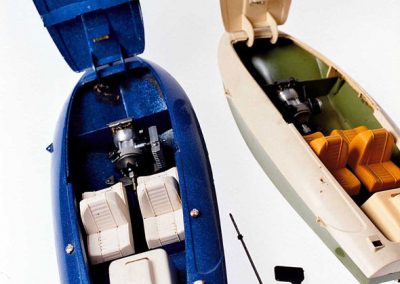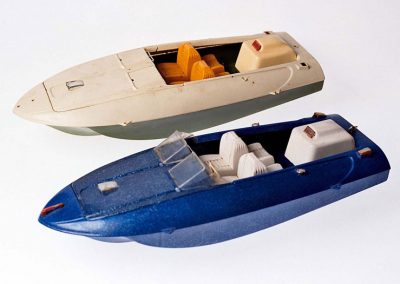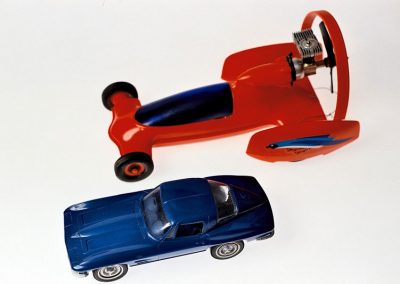Below you can view more photos of Leroy Cox, and his groundbreaking miniature engines. Click images to enlarge.
Leroy and Associates
Leroy Cox (center) with other company officials. Photo courtesy of Pegasus Hobbies archives.
Leroy on the Factory Floor
Leroy Cox on the factory floor with a production worker. In front of them is a pile of parts ready for assembly. Photo courtesy of Pegasus Hobbies archives.
Cox Co. Correspondence
A letter from 1970, announcing the appointment of William Selzer as president of the L.M. Cox Manufacturing Company. It was then owned by Leisure Dynamics, Inc. after Mr. Cox had sold the company and retired. Letter courtesy of Pegasus Hobbies archives.
Mr. Selzer, A Cox Engineer Turned President
Mr. Selzer was the company engineer who had originally come up with the idea of machining bar stock crankcases, rather than using less reliable ones.
Cox Tee Dee .010 Engine
The .010 cubic inch Tee Dee was the smallest engine made by Cox. This one was donated to the museum by Mr. Joe Martin himself.
Tee Dee Engine With Tie Tack
This photo shows a tie tack sold as a mount for the engine. Given the engine’s size, a buyer could wear it to work, or a social occasion, attached to this tie tack!
Cox Pee Wee .020 Engine
A Cox Pee Wee .020 is shown in the original packaging. It has a needle valve at the rear of the aluminum gas tank for fuel adjustment. This engine was donated to the Joe Martin Foundation by Denny Bevis. He also included a glow plug, starting kit and several props—all new and in their original packaging.
Cox Tee Dee .020 Engine
A Cox Tee Dee .020 in its original packaging. It also includes the original instruction sheet, and two spark plug wrenches. It was donated to the museum by Joshua Vest. This engine has a red plastic gas tank, and a carburetor with needle valve in front of the cylinder.
Cox Babe Bee .049 Engine
The Cox .049 Babe Bee may be the highest production engine in the world. Some years saw production of this engine top 1 million, and it was available for many years. The one on the left was donated by Tom Boyer. The one on the right with the spring starter was donated by Bill Holcomb—along with an original bubble pack card showing a sale price of $4.69.
Cox Tee Dee .051 Engine
The Cox Tee Dee .051 was made in 1961, and was basically a .049 with a slightly longer stroke. (Bore: 0.410″, Stroke: 0.386”). The packaging refers to it as a front rotary valve contest engine. This one was also donated by Joe Martin.
Cox Tee Dee .051 Engine
This one is still in the original packaging. Inside the base were glow plug wrenches and an instruction sheet. A special notice enclosed within states that this engine was fitted with a new high compression glow head. This glow head has three .005″ thick copper head gaskets installed at the factory. The idea was to remove one or two of them after the first few runs. This would increase rpm by about 250 for each gasket removed.
Cox Tee Dee .051 Engine
The ease of starting was somewhat compromised by the increase in rpm, and the accompanying increase in compression. Cox racing fuel (red can) was recommended for this engine.
Cox PT-19 Control Line Trainer
Many real pilots learned to fly in the full-size version of this plane, and many kids took to the air for the first time with the Cox version. The wings were attached to the fuselage with rubber bands that would come off in case of a crash.
Cox Sea Bee Speedboats
These Sea Bee speedboats are shown with the engine cover open, exposing the Cox Babe Bee .049 engines inside.
Cox Sea Bee Speedboats
The marine version of the engine in the blue boat featured a head with large cooling fins.

